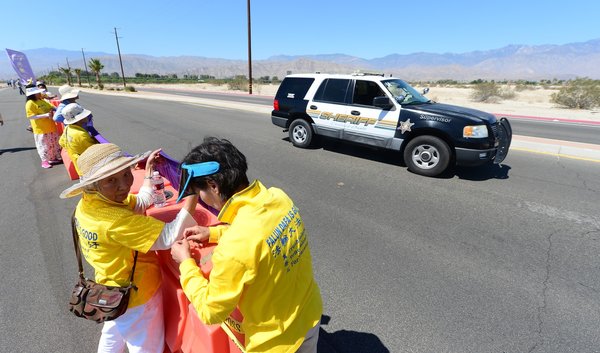
Falun Gong followers protest Chinese President Xi in desert visit
Los Angeles Times
By Rick Rojas
June 8, 2013, 5:15 a.m.
INDIAN WELLS, Calif.–The crowd of demonstrators hurried to unfurl their posters and take their position at the site of what looked like a motorcade zipping down the drive from the resort.
Chinese President Xi Jinping was believed to be staying there, as he arrived in the Southern California desert for meetings with President Obama. This group, like others in the area, had been posted in their particular spot throughout the day Friday in the hope of sending a message to Xi — or whoever it might have been in the limousine with the deeply tinted windows.
They were followers of Falun Gong, a spiritual practice they described as centered on “truthfulness, compassion, forbearance.”
“It helps us to reach a peaceful mind,” said Lily Yu, a freelance journalist from San Francisco who works for Chinese-language media. “Life becomes more harmonious.” But in China, the practice can lead to arrest, and, as some claim, labor camps and torture.
The dozens of protesters wanted Xi to hear their calls for an end to the alleged persecution and to bring those accused of perpetrating it to justice.
It’s “so harmful, so ridiculous,” said Tao Yin of San Jose, who rode in a van from the Bay Area overnight with seven others. “How the world can tolerate that doesn’t make sense to me.”
That’s why their message was intended for President Obama as well. He must stand firm on human rights, many said.
“They have to make the choice,” said Xiao Wang, who recently moved with her husband to the Bay Area from Los Angeles. “President Obama has to make the choice between the economy and upholding human rights.”
Wang, like many in the group that assembled, had accounts of oppression that hit close to home.
Her father, a retired judge, had been detained, sentenced to four years. The last time her family saw him, he’d withered, losing more than 30 pounds and could hardly walk on his own. She came, she said, because she had to speak up for him.
“Otherwise, I cannot forgive myself,” said Wang, 37. “As his only daughter, I have to do something to help him.”
Zhenbo Chen, 49, said that she had spent about 18 months detained in a labor camp. She said through a translator that she was ordered to write a statement renouncing Falun Gong. She refused. She said she was handcuffed, with her arms spread, to an open window for seven days.
She said she was mistreated, and food and water were withheld.
“I must survive,” she said she told herself, “and I must go on with life. I want to tell the whole world what happened in this labor camp to me.”
Not long after the motorcade passed, the group retreated from the sweltering desert heat to a shady area. Some were sprawled on blankets, others pressed damp rags on their faces or veiled themselves with cotton sheets for some respite.
Since coming to the U.S., many said their experience here had only emboldened their resolve to demonstrate. “This wouldn’t happen in China,” Yin, 40, said. “We still have the freedom to demonstrate, to let Xi see us.”
Chen, sitting on the grass beneath a tree with her legs crossed, looked peaceful. She said she had been an accountant, and the power that had come with her position corrupted her. Falun Gong transformed her, she said. Her quick temper evaporated, as did her stress. Her health improved. And she said she had come to terms with her imprisonment.
“Yes, I have forgiven them,” she said of those who detained her and the guards who mistreated her. “I don’t hate them. I pity them.”
She isn’t as quick to forgive the Communist Party and China’s leaders. But she still has optimism that President Xi will take in their plea for justice. “I hope he will listen.”
